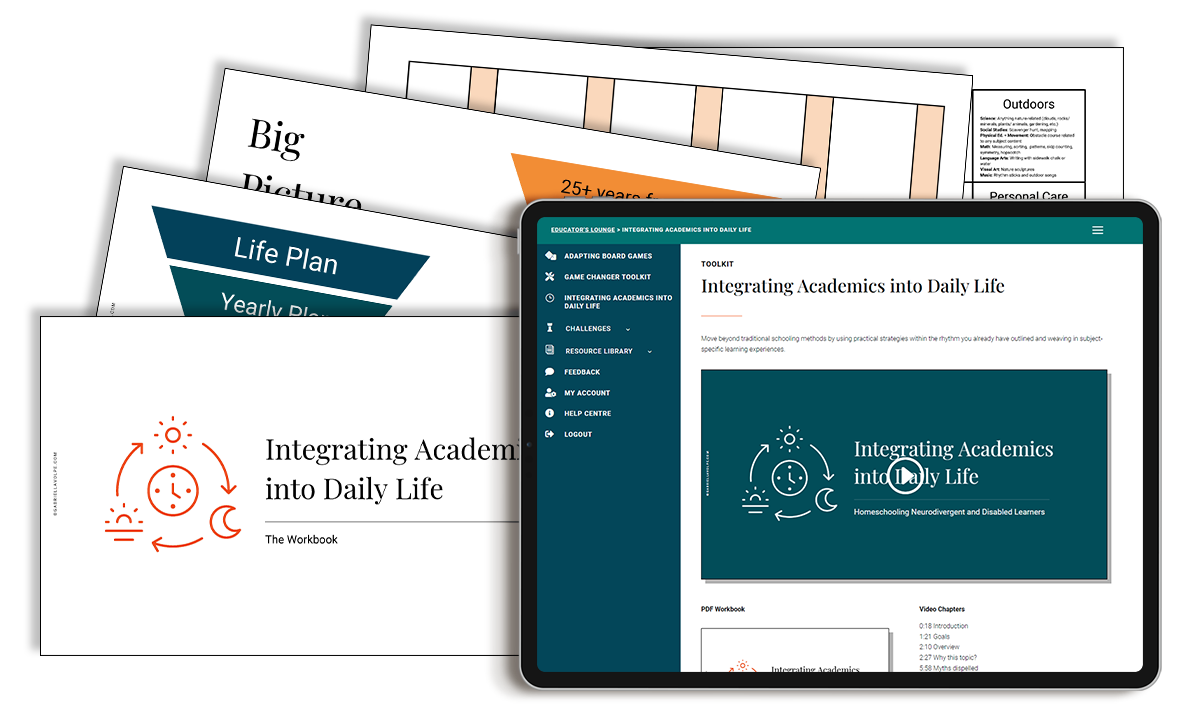It is during periods my son is very sick that I find myself incredibly grateful we’re home educating.
I don’t have to dash off to work–frazzled and fretting. I don’t have to look for a replacement for the days where I absolutely can’t go in. I’m not rushing my son out the door, unwell and pale to get onto a school bus or to a sitter.
In fact, I don’t have to do anything but focus on helping him heal.
That got me thinking about the many benefits of home educating a disabled child.
Here are my personal favorites when a child is unwell or frequently sick:
- A parent can calmly and thoroughly look after a child’s health issues.
- The learning pace can be whatever the child can handle on a specific day–all depending on how little or how much they can concentrate on (it might mean reading a book a day, or it could be more, or even less).
- A parent can prepare healthy, nourishing meals/snacks and make that the focus of learning.
- School days don’t have to be Monday to Friday. If the child is better by the weekend, we can take on a few activities then.
- A parent can get the rest they need as the child recuperates.
Here are additional benefits of home educating a disabled child:
- Parents have the freedom to take a child where they want for additional learning experiences.
- Parents easily tap into their learning styles.
- One-to-one, hands-on experiences for a greater part of the day.
- Nobody knows the child better than parents do–there is no wasted time with paperwork and no need for meetings for outsiders to get to know him before “getting to work” each year.
- The parent-child bond is great. Since they trust their parent(s), a child can lovingly be pushed a little farther which will help them reach new goals in a loving environment.
- Life and personal skills are learned in the place where they will be using them.
- A calm parent makes for a more relaxed child, thereby reducing the frequency of meltdowns.
Here are what some homeschoolers had to say about the benefits of home educating their children:
“Flexibility: in curriculum choices, in scheduling choices; control: over what subjects we do when, and over how long our school day is.”
– Linda W. Homeschooling mom, Web-Home-School.com
“I like the gift of time. We’re not hurried or rushed and we get plenty of time together. This allows me to really observe my kids and reflect on how they learn best. And learning can unfold naturally without a timeline. We can stick with things that are interesting and see where they lead. Or drop things that are boring and return to them later when they may be more relevant. The gift of time allows us a lot of flexibility. When I taught for school districts, we were always pressed for time. Observation and reflection (the most important pieces in my mind!) were often the first things to go. Now I spend most of my time observing and reflecting while my kids spend most of their time taking the lead in what they want to learn. We all learn a lot this way!”
– Katy Barrett, Homeschooling mom of two, The Little Strathmore Schoolhouse
“The ability to customize the learning experience.”
– Marya Mesa, Homeschooling mom of four, faith blogger
One parent who does not homeschool (but surely thinks like a home educator!) sees it this way:
“I don’t homeschool, but sometimes children with special needs are in transit to and from school for hours a day. I really don’t think having to wake up tremendously early for a long ride helps the children be available for learning once they finally get to school. Plus, if one of the objectives at this point in time is potty training, how do we expect them to “hold it in” for a ridiculous amount of time? Eliminating a long commute time would be one of the many benefits of homeschooling.”
– Chantal, Mom of two, one of whom is on the autism spectrum
And, finally, some solid points made here:
“Being able to find what they are good at and develop it. My friend’s daughter is now a genius at art and design already at 13 as a result, and could get a job or work for herself tomorrow – her designs are out of this world. Whereas where we live she would have barely seen a paintbrush till she entered senior school, as the junior schools are being forced to focus so hard on hitting literacy and maths targets that the kids don’t get to be creative. It really benefits children with a creative streak or a special talent. And on the whole, if you have a kid with dyslexia, dyspraxia or who just struggles with the academic side, they are going to probably suffer in school. I am seriously thinking of home ed for my youngest now as he is being told off a lot for not keeping up; the pressure on the teachers gets handed down to the children.”
– Lisa Williams, mom of two
Related articles:

Integrating Academics into Daily Life Workshop
Discover how to integrate academics into daily life. For homeschoolers of neurodivergent and disabled learners.

0 Comments